Sunday, August 31, 2008
Persona
The first week of Fall semester is over, and with it a flurry of activity: meeting new classes, preparing talking notes, and working on a teaching portfolio due to the college on September 2.
Working on talking notes for Walt Whitman during this long weekend, I have been thinking again about how writers create a persona in order to tell their stories (or write their poems). The longer I write, the more I come to understand this process of donning the mask.
It is quite a paradox that someone like me, who values authenticity to an extreme, should find herself putting on masks and telling "lies."
When I was at Provincetown, I went to a library book sale and found a great old book by Sherwood Anderson called Tar. It is a beautiful old book, published in 1928. In the introduction to Tar, Anderson wrote of how he had sat down to tell his autobiography but found it quite impossible until he had created a fictional character (Tar) through which to stage his utterance. He called his process "an old writer's trick." It is very old, indeed.
In Latin, persona means mask. It refers to the mask worn by actors in ancient theater. But the true origin of persona is in archaic rituals; it is related to archaic religion. The Iroquois had a healing ritual involving masks. They believed that if you saw a demon in a dream, you had to carve a likeness of the demon and wear the likeness as a mask. The mask gave the dreamers power over their ordeal and also the power to cure others.
When Walt Whitman says, "I depart as air," he doesn't just speak of the wind or to the wind, he becomes the wind. And he then steals the primitive power of the wind for himself. When he says, "I am untranslatable, / I sound my barbaric yawp over the roofs of the world" he partakes--becomes one with--the primal world. And when he says, "You will hardly know who I am or what I mean, / But I shall be good health to you nevertheless, And filter and fibre your blood" he travels through our veins and is pumped by our hearts. We become strong and aware like he was--we take on his qualities--because we drink his words as Siegfried drank the blood of the dragon he slayed. Adopting a persona has a quality of animism.
Whitman's persona of the oracle is brilliant. He can be anything or anyone; he contains multitudes; he cuts through time and becomes part of what is eternal.
I think the adopting of a persona is the hardest thing for writers to learn. It means creating a second-self.
The persona, of course, does not need to be a demon. It can be an angel; it can be an oracle (as in the case of Whitman); it can be a serial-killer; it can be a little child; it can be an inanimate object. The point is, it cannot be you.
Your psyche will always keep the deepest part of your real self hidden. But you can imagine the deepest part of a second-self; or the second-self can help you to unearth the some parts of yourself that you characteristically hide. And you can reveal those things safely from behind the mask.
Creating a persona is an exercize in magical thinking. It is very hard to discover how to do it; it is a mysterious process. But until the process is mastered, our works will not be everything they can be.
If you would understand me go to the heights or water-shore,
The nearest gnat is an explanation, and a drop or motion of waves a key,
The maul, the oar, the hand-saw, second my words.
Wednesday, August 20, 2008
Provincetown 50
When I came to the lab to check my e-mail, I learned that Philip F. O'Connor, my mentor when I was in the MFA program at BGSU has died. He was the most generous teacher I ever had. He was a big man with a big soul. When your story came up for workshop, he could put you on cloud nine or leave you quaking in your boots. But you never lost sight that what you were doing was special and important.
Rest in Peace, Phil.
Monday, August 18, 2008
Provincetown 49
 "Mirror, Mirror on the Wall"
"Mirror, Mirror on the Wall"This one was so much fun to do. It came together after I found the card for the "The Paper Fool." I guess fairy tales were on my mind because I'll be teaching a course on fairy tales this fall. I also had been reading in The Golden Bough about the symbolism of mirrors.
This is my last week at Provincetown! On the 25th classes start and I am back to my other life. It has been productive, and it has been a blast.
Friday, August 15, 2008
Provincetown 48
 Taste, O Taste and See
Taste, O Taste and SeeI like to tell a story with my collages. The collages give me a chance to use visual symbolism freely. The great thing about a collage is that the onlooker can create his or her own story.
My new journal is filling quickly. I have ordered some good watercolor paper and plan to hand-stitch my next journal.
Thursday, August 14, 2008
Provincetown 47
 Prayer
PrayerAnother letter from Allen today. He knows me. His letter encouraged me to step out of my dream world for a while and take in the world through my senses. So I went for a very long walk, all the way out to the rock jetty. It was the first time I'd walked that far. I came back and did this collage to honor the letter. He reminded me of how wonderful this place is and how much I will miss it. But he stressed:
"You are there now! Dig your hands into the sand. Feel that water. Reach out and touch buildings, stone walls, even the ground you walk on. Close your eyes. What do you feel?"
He reminded me: "Your heart will long for these things."
I wrote these words on the collage, as well as some Buddhist sayings: "My true religion is kindness," and "Test all things for yourself." I also included the idea that the span of a human life is "one breath." I love this idea: to be mindful with each breath that you are alive. To live an entire lifetime within the span of that breath. And then to do it again. And again. And again.
The moon is out here in Provincetown tonight. It is the same moon that is above you right now. We are looking at the same moon.
Good-night.
Provincetown 46

Wednesday, August 13, 2008
Provincetown 45

Show and Tell
This one is about the imaginative process and the writing process. The title is wonderfully ambiguous. It refers to what creative writing teachers always tell their students AND it refers to joyful sharing. This one went together very quickly! Can anyone say "Horror Vaccui?"
Someone recently asked me to explain how doing the collages helps me with my writing. It's a bit of a mysterious process; I'm not sure I understand how it works myself. I have been reading a lot of haiku the last couple of days. And the haiku that I like the best creates a strong visual image. It goes beyond words. The words disappear. I think the collages I do are my way of marrying together pictures and words. It is a halfway house for what I want to do in words. I want my words to disappear when someone reads them. I want my stories to enter deeply into the imagination, into that part of the self which dreams. I like working with the symbols of that world.
Making the collages is also meditative. My brain gets tired when I write for long periods of time. I've been so focused on my writing for the last few weeks that my spirit needs rejeuvanation now. The collages are rejeuvanating. I feel myself going deeply into my inner thoughts as I work on them. It's calming and thrilling at the same time.
Tuesday, August 12, 2008
Provincetown 44
 Letter #12
Letter #12I spent all day and all night on this one. I just finished it a few minutes ago. It is based on a letter I recently received from Allen about cutting down a mulberry tree in our yard. I thought the letter was so tender and affecting that I just had to work with it. It took me longer to do this one because I usually start out with images, not text. It was harder for me to have the text first. I tried several different arrangements until I came up with this one.
All of the collages I have done at Provincetown are done inside a Stonehenge Book of all cotton acid free pH neutral pages. The book is double wire bound. I have also been doing pen and ink pieces (mostly text) on the back of each page. I consider what I'm doing to be journaling more than anything else.
I don't expect you to be able to read the text in the collage (I took words directly out of the letter he wrote to me), so here's what it says:
Letter 12
I cut down that low hanging mulberry tree, the one that fought so hard to make it through the winter. It fell to the pace of one's last breath. Two baby birds fell out of their nest and three little brown bats hung onto tender limbs smaller than a toothpick. That evening as a pink sky was fading to purple, I checked & the bats were gone and the ants feasted on baby birds. There is a lot of life and death in a single mulberry tree.
Provincetown 43
I walked to town today for coffee and got caught in the rain. It rained hard for a time. And there was lightening and thunder. The thunder here at the cape is loud. It sounds like a cannon going off. I saw a man riding a bicycle and holding and umbrella! I sat in the coffee shop and sipped my latte and waited for it to abate. When it did, I walked to Far Land Grocery and got grilled salmon and salad fixings.
I got a letter from Allen today in which he described cutting down an old tree in the yard. It had been in a bad way for a while. He felt bad about it because it had struggled and made it through the winter. When the tree fell, a nest of baby birds came tumbling to the ground. There were also tiny bats, he said, clinging to tiny limbs . One of the bats had a broken wing. He carried the bats to another tree, but there wasn't anything he could do for the birds. He said there was so much life and death involved in the cutting down of just one tree.
Monday, August 11, 2008
Provincetown 42
Provincetown 41
Provincetown 38
 Hollywood
HollywoodFor Judi Heartsong
This is the fourth image I made yesterday. It includes parts of a postcard that Judi Heartsong sent to me recently from California, so I have dedicated it to her.
Sunday, August 10, 2008
Provincetown 37
1. I was getting way too close to the material and couldn't see the forest for the trees, and
2. I needed to work on syllabi and teaching portfolio materials for school.
Yesterday, I took a walk into town to clear my head. I had coffee, and then went into some shops. Until yesterday, I hadn't been into most of these places. I bought a book about angels and an art magazine. I also went into Tim's used bookstore and found a beautiful volume of Haiku poems. It's a tiny thing, published in 1955-56 by Peter Pauper Press. Reading through the Haiku I suddenly got an idea for a story, a simple story, a child's story, perhaps, or a teaching story like Jesus would tell. I could see the whole thing clearly in my mind. I made some preliminary notes and did a small art project. Now I feel ready to write the story. I plan to write it today.
Usually, now, when I write a story it's in the back of my mind what I will do with it: where I will send it for possible publication. This time, I just want to write the story. I am really looking forward to writing it.
This is going to provide a nice break from the book. I've worked the field of that book so much, grown so many crops there, that it needs to lie fallow for a while.
My time here is quickly approaching an end. Allen will join me here again on the evening of the 20th. We will spend a couple of days playing, and then it will be time to teach again on the 25th. What an incredible experience this has been!
Tuesday, August 05, 2008
Provincetown 36
 My flowers on my kitchen counter: a nice shaft of sunlight behind Teddy.
My flowers on my kitchen counter: a nice shaft of sunlight behind Teddy.Yesterday, I discovered a surprise on my steps. My three sons, it seems, had flowers sent to me (Teddy Bear attached). You know you've crossed a threshold when your children give YOU a teddy bear! I was floored; we're not a gift-giving family because we don't believe in social obligations. Sweeter still are the gifts we do give and receive, then. I think this is the first time my boys have ever given flowers. Maybe they miss me.
Monday, August 04, 2008
Provincetown 35
Rather than consider Jeoffry to be cruel by playing with his prey, Smart gives us another perspective: "For when he takes his prey he plays with it to give it a chance. /
For one mouse in seven escapes by his dallying." Praise the cat for what he IS, not what we may WISH him to be. Also that he is an "instrument for children to learn benevolence upon." That line to me now is just unspeakably beautiful. Everything exists for us to learn benevolence upon, Smart seems to be saying. We are all children, babes to every new day. We don't know what will be required of us no more than children know.
I've written much about our dogs; I love them dearly. But I also love my cats and when hard pressed to explain the difference between a cat and dog, I find myself saying, "Dogs don't purr."
And, look, Jeoffry purrs "in thankfulness," when God tells him he is a good cat.
I shall try to live like Jeoffry. I shall try to write like Jeoffry lives. So be my prayer.
For I Will Consider My Cat Jeoffry (excerpt, Jubilate Agno)
For I will consider my Cat Jeoffry. For he is the servant of the Living God duly and daily serving him.
For at the first glance of the glory of God in the East he worships in his way.
For this is done by wreathing his body seven times round with elegant quickness.
For then he leaps up to catch the musk, which is the blessing of God upon his prayer.
For he rolls upon prank to work it in.
For having done duty and received blessing he begins to consider himself.
For this he performs in ten degrees.
For first he looks upon his forepaws to see if they are clean.
For secondly he kicks up behind to clear away there.
For thirdly he works it upon stretch with the forepaws extended.
For fourthly he sharpens his paws by wood.
For fifthly he washes himself.
For sixthly he rolls upon wash.
For seventhly he fleas himself, that he may not be interrupted upon the beat.
For eighthly he rubs himself against a post.
For ninthly he looks up for his instructions.
For tenthly he goes in quest of food.
For having consider'd God and himself he will consider his neighbour.
For if he meets another cat he will kiss her in kindness.
For when he takes his prey he plays with it to give it a chance.
For one mouse in seven escapes by his dallying.
For when his day's work is done his business more properly begins.
For he keeps the Lord's watch in the night against the adversary.
For he counteracts the powers of darkness by his electrical skin and glaring eyes.
For he counteracts the Devil, who is death, by brisking about the life.
For in his morning orisons he loves the sun and the sun loves him.
For he is of the tribe of Tiger.
For the Cherub Cat is a term of the Angel Tiger.
For he has the subtlety and hissing of a serpent, which in goodness he suppresses.
For he will not do destruction, if he is well-fed, neither will he spit without provocation.
For he purrs in thankfulness, when God tells him he's a good Cat.
For he is an instrument for the children to learn benevolence upon.
For every house is incomplete without him and a blessing is lacking in the spirit.
For the Lord commanded Moses concerning the cats at the departure of the Children of Israel from Egypt.
For every family had one cat at least in the bag.
For the English Cats are the best in Europe.
For he is the cleanest in the use of his forepaws of any quadruped.
For the dexterity of his defence is an instance of the love of God to him exceedingly.
For he is the quickest to his mark of any creature.
For he is tenacious of his point.
For he is a mixture of gravity and waggery.
For he knows that God is his Saviour.
For there is nothing sweeter than his peace when at rest.
For there is nothing brisker than his life when in motion.
For he is of the Lord's poor and so indeed is he called by benevolence perpetually--Poor Jeoffry! poor Jeoffry! the rat has bit thy throat.
For I bless the name of the Lord Jesus that Jeoffry is better.
For the divine spirit comes about his body to sustain it in complete cat.
For his tongue is exceeding pure so that it has in purity what it wants in music.
For he is docile and can learn certain things.
For he can set up with gravity which is patience upon approbation.
For he can fetch and carry, which is patience in employment.
For he can jump over a stick which is patience upon proof positive.
For he can spraggle upon waggle at the word of command.
For he can jump from an eminence into his master's bosom.
For he can catch the cork and toss it again.
For he is hated by the hypocrite and miser.
For the former is afraid of detection.
For the latter refuses the charge.
For he camels his back to bear the first notion of business.
For he is good to think on, if a man would express himself neatly.
For he made a great figure in Egypt for his signal services.
For he killed the Ichneumon-rat very pernicious by land.
For his ears are so acute that they sting again.
For from this proceeds the passing quickness of his attention.
For by stroking of him I have found out electricity.
For I perceived God's light about him both wax and fire.
For the Electrical fire is the spiritual substance, which God sends from heaven to sustain the bodies both of man and beast.
For God has blessed him in the variety of his movements.
For, tho he cannot fly, he is an excellent clamberer.
For his motions upon the face of the earth are more than any other quadruped.
For he can tread to all the measures upon the music.
For he can swim for life.
For he can creep.
Christopher Smart
Saturday, August 02, 2008
Provincetown 34
1. This has to do with an article I recently read in the New Yorker about Stuart Little. Apparently there was much controversy about Stuart's origins, the way he was born small and looking like a mouse to human parents. I liked the article so much that I sent it to Erin (Erin's Everyday Thoughts) who is getting her MFA in writing chrildren's literature.
I dreamed that I had a child, a tiny being looking like a tiny little boy. He was a perfectly formed little boy but only about five inches tall. He was brought to me in the hospital wrapped in a baby blanket, rather lost in the blanket. I looked at the child and said, "Do you know who I am?" And the child said, "You're mama." And I said, "How did you know that?" And he said, "Santa Clause told me!"
2. In the other dream, I was lost in an old rerun of Oprah, in which she had taken her audience across a highway to listen to a talk given by Robert MacNamara and others. The talk happened in the summer, but in "real time" it was winter. In one part of the dream, a beautiful woman stood on a balcony in a summer dress. The dress was sleeveless and backless. But everything behind her cold and dreary with winter. I don't know where that dream came from.
Friday, August 01, 2008
Provincetown 33
I added a short section today (at the beginning) that I think may lead to much more development. A character who has been much in the background may be stepping forward into a starring role. We shall see!
Had a nice meal from Far Land Grocery, today, a beautiful, fresh sandwich, potato salad and a sparkling fruit ade.
Pages
Dreaming
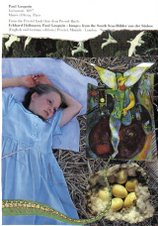
About Me

- Theresa Williams
- Northwest Ohio, United States
- "I was no better than dust, yet you cannot replace me. . . Take the soft dust in your hand--does it stir: does it sing? Has it lips and a heart? Does it open its eyes to the sun? Does it run, does it dream, does it burn with a secret, or tremble In terror of death? Or ache with tremendous decisions?. . ." --Conrad Aiken
Followers
Facebook Badge
Search This Blog
Favorite Lines
My Website
Epistle, by Archibald MacLeish
Visit my Channel at YouTube
Great Artists
Fave Painting: Eden
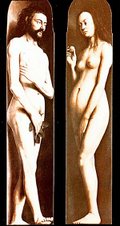
Fave Painting: The Three Ages of Man and Death

by Albrecht Dürer
From the First Chapter
My Original Artwork: Triptych
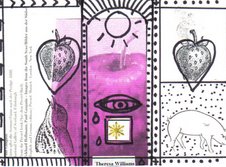
Wishing
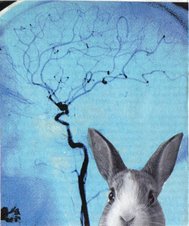
Little Deer
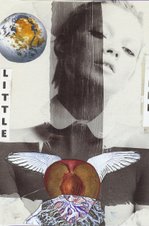
Transformation
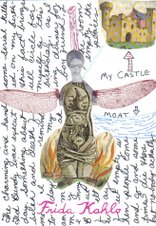
Looking Forward, Looking Back
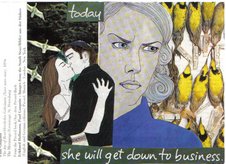
Labels
- adolescence (1)
- Airstream (7)
- Alain de Botton (1)
- all nighters (2)
- Allen (1)
- altars (1)
- Angelus Silesius (2)
- animals (1)
- Annie Dillard (1)
- Antonio Machado (2)
- AOL Redux (1)
- April Fool (1)
- Archibald MacLeish (1)
- arts and crafts (55)
- Auden (1)
- awards (2)
- AWP (2)
- Bach (1)
- Basho (5)
- Beauty and the Beast (1)
- birthdays (1)
- blogs (5)
- boats (2)
- body (2)
- books (7)
- bookstores (1)
- Buddha (1)
- Buddha's Little Instruction Book (2)
- butterfly (4)
- buzzard (2)
- Capote (4)
- Carmel (1)
- Carson McCullers (1)
- cats (15)
- Charles Bukowski (1)
- Charles Simic (2)
- Christina Georgina Rossetti (1)
- church (2)
- confession (1)
- Conrad Aiken (1)
- cooking (5)
- crows (1)
- current events (2)
- D. H. Lawrence (3)
- death (6)
- Delmore Schwartz (4)
- detachment (1)
- dogs (7)
- domestic (3)
- dreams (21)
- Edward Munch (4)
- Edward Thomas (1)
- Eliot (3)
- Eliot's Waste Land (2)
- Emerson (2)
- Emily Dickinson (10)
- ephemera (1)
- Esalen (6)
- essay (3)
- Eugene O'Neill (3)
- Ezra Pound (1)
- F. Scott Fitzgerald (1)
- fairy tales (7)
- Fall (16)
- Famous Quotes (16)
- festivals (2)
- fire (5)
- Floreta (1)
- food (1)
- found notes etc. (1)
- found poem (2)
- fragments (86)
- Frida Kahlo (1)
- frogs-toads (4)
- Georg Trakl (1)
- gifts (1)
- Global Warming (1)
- Gluck (1)
- goats (1)
- Goodwill (1)
- Great lines of poetry (2)
- Haibun (15)
- haibun moleskine journal 2010 (2)
- Haiku (390)
- Hamlet (1)
- Hart Crane (4)
- Hayden Carruth (1)
- Henry Miller (1)
- holiday (12)
- Hyman Sobiloff (1)
- Icarus (1)
- ikkyu (5)
- Imagination (7)
- Ingmar Bergman (1)
- insect (2)
- inspiration (1)
- Issa (5)
- iTunes (1)
- Jack Kerouac (1)
- James Agee (2)
- James Dickey (5)
- James Wright (6)
- John Berryman (3)
- Joseph Campbell Meditation (2)
- journaling (1)
- Jung (1)
- Juniper Tree (1)
- Kafka (1)
- Lao Tzu (1)
- letters (1)
- light (1)
- Lorca (1)
- Lorine Niedecker (2)
- love (3)
- Lucille Clifton (1)
- Marco Polo Quarterly (1)
- Marianne Moore (1)
- Modern Poetry (14)
- moon (6)
- movies (20)
- Muriel Stuart (1)
- muse (3)
- music (8)
- Mystic (1)
- mythology (6)
- nature (3)
- New Yorker (2)
- Nietzsche (1)
- Northfork (2)
- November 12 (1)
- October (6)
- original artwork (21)
- original poem (53)
- Our Dog Buddha (6)
- Our Dog Sweet Pea (7)
- Our Yard (6)
- PAD 2009 (29)
- pad 2010 (30)
- Persephone (1)
- personal story (1)
- philosophy (1)
- Phoku (2)
- photographs (15)
- Picasso (2)
- Pilgrim at Tinker Creek (1)
- Pillow Book (5)
- Pinsky (2)
- plays (1)
- poem (11)
- poet-seeker (9)
- poet-seer (6)
- poetry (55)
- politics (1)
- poppies (2)
- presentations (1)
- Provincetown (51)
- Publications (new and forthcoming) (13)
- rain (4)
- Randall Jarrell (1)
- reading (6)
- recipes (1)
- Reciprocity (1)
- Richard Brautigan (3)
- Richard Wilbur (2)
- Rilke (5)
- river (5)
- river novel (1)
- rivers (12)
- Robert Frost (2)
- Robert Rauschenberg (1)
- Robert Sean Leonard (1)
- Robinson Jeffers (1)
- Rollo May (2)
- Rumi (1)
- Ryokan (1)
- Sexton (1)
- short stories (13)
- skeletons (2)
- sleet (1)
- snake (1)
- Snow (24)
- solitude (1)
- spider (2)
- spring (1)
- Stanley Kunitz (1)
- students (2)
- suffering (4)
- suicide (2)
- summer (20)
- Sylvia Plath (2)
- Talking Writing (1)
- Tao (3)
- teaching (32)
- television (4)
- the artist (2)
- The Bridge (3)
- The Letter Project (4)
- The Shining (1)
- Thelma and Louise (1)
- Theodore Roethke (16)
- Thomas Gospel (1)
- Thomas Hardy (1)
- toys (3)
- Transcendentalism (1)
- Trickster (2)
- Trudell (1)
- Ursula LeGuin (1)
- vacation (10)
- Vermont (6)
- Virginia Woolf (1)
- Vonnegut (2)
- Wallace Stevens (1)
- Walt Whitman (8)
- weather (7)
- website (3)
- what I'm reading (2)
- William Blake (2)
- William Butler Yeats (5)
- wind (3)
- wine (2)
- winter (24)
- wood (3)
- Writing (111)
- Zen (1)







